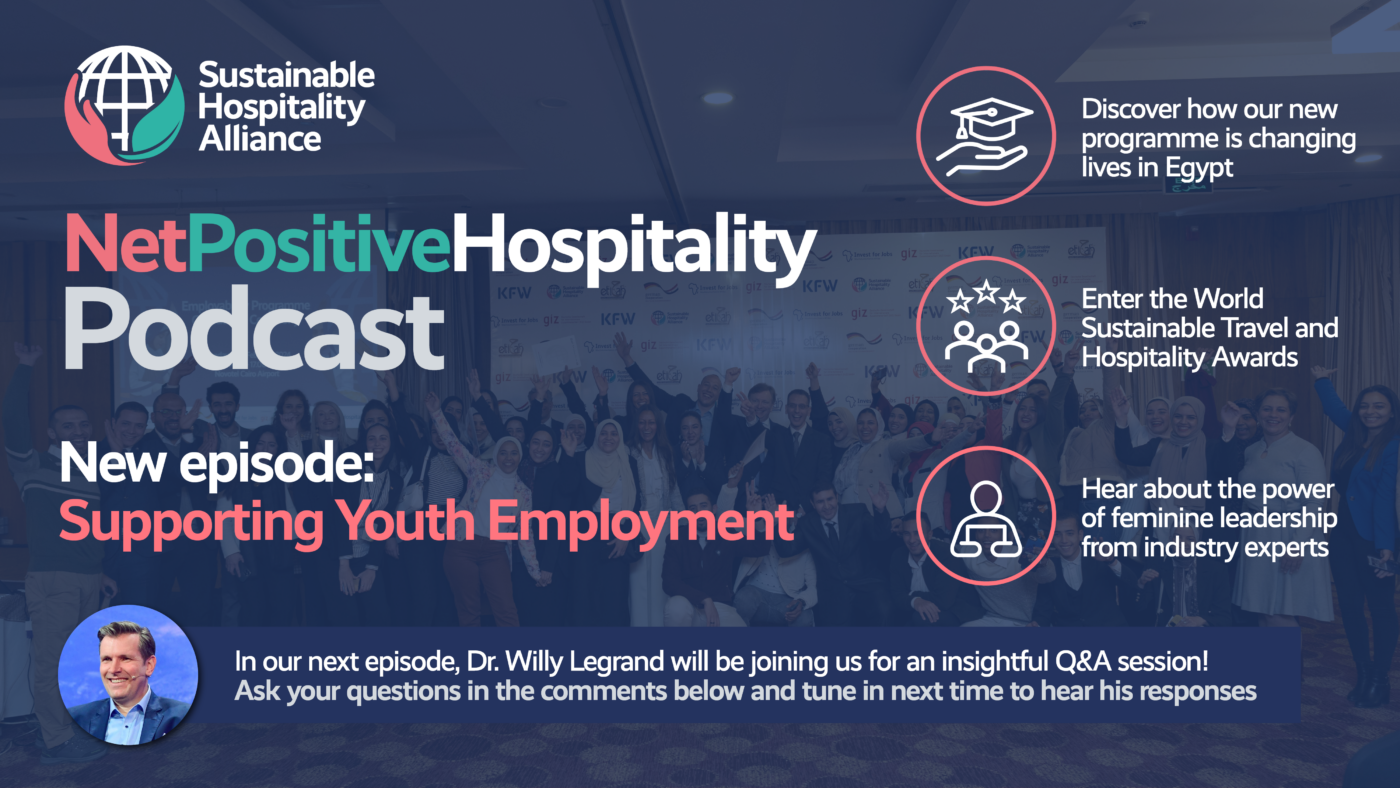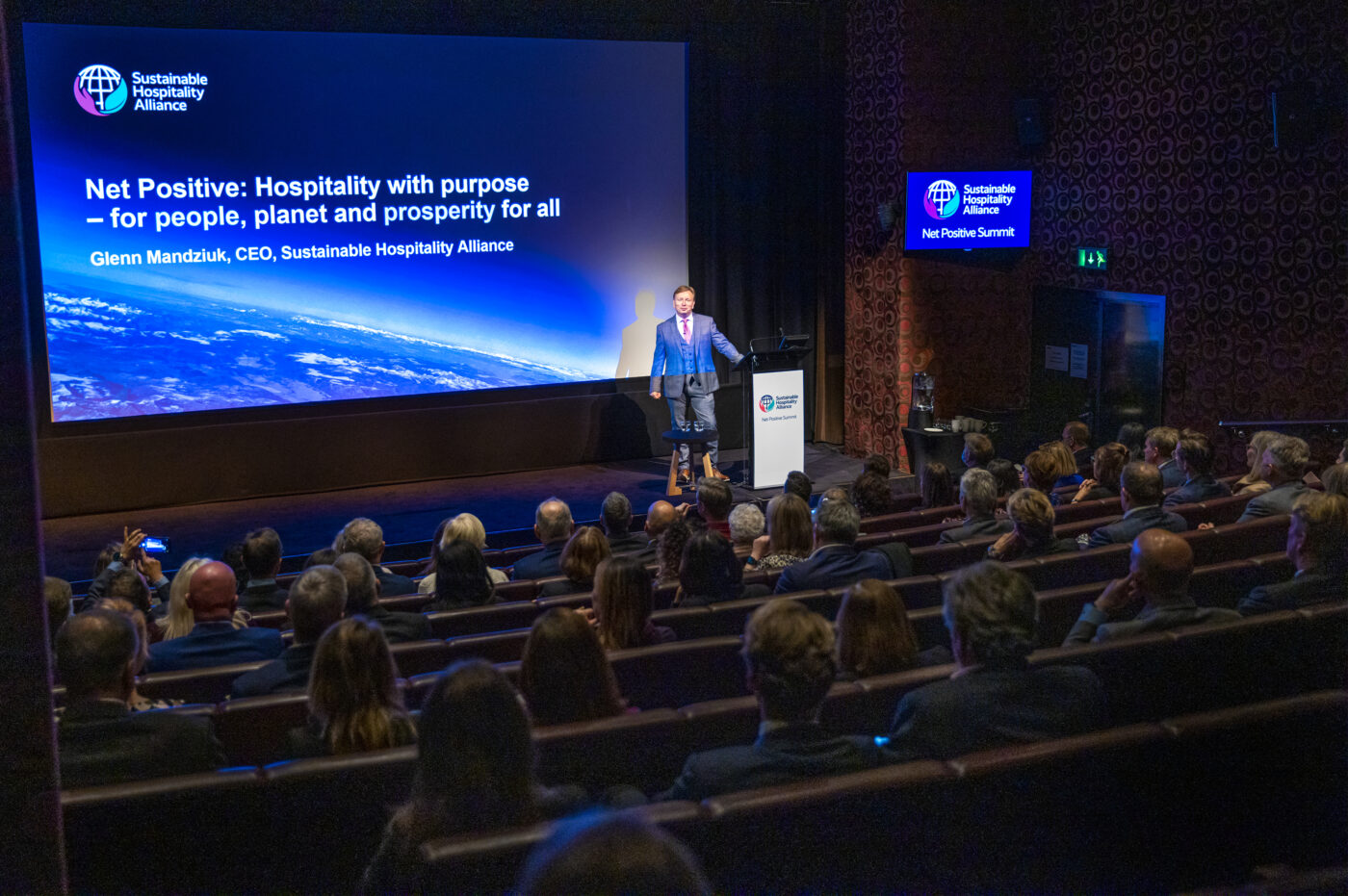The International Tourism Partnership (ITP) today announces the four Goals supported by ITP member companies as the major industry reference point to drive progress towards sustainability.
The ITP Goals are a carefully constructed and practically achievable response to four of the core sustainability issues impacting responsible hospitality providers globally. At a glance, they include:
- Youth employment: Collectively impact one million young people through employability programmes by 2030, thereby doubling the industry’s current impact on youth unemployment.
- Carbon: Embrace science-based targets, and encourage the wider industry to join in reducing emissions at scale
- Water: Embed water stewardship programmes to reduce the number of people affected by water scarcity; also improve water-use efficiency and identify ways to address water scarcity.
- Human rights: Raise awareness of human rights risks, embed human rights into corporate governance, and address risks arising in the labour supply chain and during hotel construction.
ITP’s Goals send a clear call to action to the wider industry about the critical importance of using the SDGs (also called the Global Goals) as a focal point to drive responsible business in hospitality. The launch also recognises the International Year of Sustainable Tourism for Development, which calls on the industry to coordinate to tackle issues and share best practice. ITP is an official ‘Friend’ of the initiative.
ITP is a global industry organisation, bringing together the world’s most powerful hotel companies responsible for over 25,000 hotels, in an alliance focused on a single ambition: to lead the industry through example with clear and quantifiable commitments to sustainability.
In a written endorsement, Dr Taleb Rifai, Secretary General of the UN World Tourism Organisation (UNWTO) said: “For 25 years the hotel industry under ITP’s leadership has advanced sustainable tourism; developing tools and resources for hotels and lodgings around the world, sharing knowledge and
working together for a more responsible future. ITP’s Goals are the next step to ensure continued sustainable development in our sector, setting clear aims for 2030, and bringing the hotel sector together to align with the Global Goals.”
Wolfgang M. Neumann, ITP Governing Council Chair and industry thought-leader, commented: “We have agreed on a total of four core Goals, with two addressing environmental issues (climate and water), and two supporting the people who work in the hotel industry and its supply chain. This even balance between planet and people reflects the passions and dedication of ITP members to make a real and lasting difference to a broad range of issues against which commitments can be agreed.
“ITP believes that the hotel industry can be a force for good and make a positive contribution to the United Nations’ Sustainable Development Goals and to the COP21 climate agreements. Our vision for 2030 is for sustainable growth and a fairer future for all. We understand that bigger impacts can be achieved faster through the industry working together at scale; for this reason we invite other hotel companies to join with us in our commitment to these four critical goals.”
Fran Hughes, ITP Director, commented: “This cross-industry alignment to a single set of Goals is a fantastic achievement for the International Tourism Partnership. It is also a reflection of the increasing importance that the hospitality industry attaches to sustainability issues. As we move into the second half of the International Year of Sustainable Tourism for Development, business leaders have put competition to one side to create an ambitious vision for the future and a rallying call to the whole industry. By working together, I feel certain that these businesses will create a more sustainable future for the entire hospitality industry.”
To learn more about ITP’s Goals visit our interactive digital page. And see ITP Goals here. You can download the ITP Goals press release and Goals one pager from the Press Room.
Goals at a Glance
The four agreed industry Goals are a carefully constructed and practically achievable response to four of the core sustainability issues impacting responsible hospitality providers on a global level. At a glance, they include:
- Youth employment: Collectively impact one million young people through employability programmes by 2030, thereby doubling the industry’s current impact on youth unemployment.
- Carbon: Embrace science-based targets, and encourage the wider industry to join in reducing emissions at scale
- Water: Embed water stewardship programmes to reduce the number of people affected by water scarcity; also improve water-use efficiency and identify ways to address water scarcity.
- Human rights: Raise awareness of human rights risks, embed human rights into corporate governance, and address risks arising in the labour supply chain and during hotel construction.
Youth employment
More than 71 million young people (aged from 15 to 24) worldwide are looking for work and 156 million young workers are living in poverty, often due to unstable, irregular jobs. Many find themselves working in difficult or dangerous conditions, often outside the boundaries of the formal economy.
The hotel industry is well-equipped to offer meaningful work and career development options to young people, as it is growing at 4% each year, and currently providing around one in ten of all jobs.
ITP members will collectively impact one million young people under the age of 25 through their own employability programmes by 2030. This doubles their current impact on youth employability.
ITP members also encourage the uptake of the Youth Career Initiative (YCI), created by the industry to bridge the gap between youth unemployment and a poor talent pipeline for hotels to recruit. There are more than 3,000 YCI graduates to date across 14 countries, with an 85% success rate of employment or returning to education.
Carbon
Rising carbon emissions are accelerating climate change with devastating impacts on communities and biodiversity. The hotel industry already accounts for around 1% of global emissions and this is set to increase as hospitality continues to grow.
The hotel industry must reduce its absolute carbon emissions by 66% by 2030 and 90% by 2050 to stay within the 2˚C threshold agreed at COP21; this is a quantifiable “science-based target”.
To drive sustainable growth for the future, ITP members embrace the ambition of science-based targets and encourage the wider industry to join their collaboration to develop carbon reductions at scale.
ITP members also encourage the uptake of consistent reporting through the use of the Hotel Carbon Measurement Initiative (HCMI), developed in collaboration with ITP and already used by over 24,000 hotels worldwide. The initiative provides a common methodology for measuring and reporting on the carbon footprint of a hotel stay or meeting.
Water
Demand for freshwater is likely to outstrip supply by 40% by 2030 and a third of the world’s population will be living in areas of severe water stress by this time. In many countries, water consumption per guest in hotels greatly exceeds that of the local population, so the industry has a responsibility to encourage responsible use and consumption.
To improve water stewardship across the industry, ITP members commit to embedding water stewardship programmes across their hotel portfolios as a means of reducing the number of people affected by water scarcity. Members also support improved water-use efficiency, sustainable withdrawals and supply of freshwater to address water scarcity.
Members encourage the uptake of the Hotel Water Measurement Initiative (HWMI), a common methodology for measuring and reporting on the water footprint of a hotel stay or meeting.
Human rights
Human rights are the basic rights and freedoms that all people are entitled to. By consensus of ITP members, human rights abuses within the sector are most likely to occur in a number of key areas: the supply chain and procurement, recruitment, the hotel construction phase, and vulnerability to human trafficking activities.
ITP members recognise the critical importance of having an increased focus on human rights. As such members focus on fighting modern slavery, human trafficking, and increasing awareness, transparency and remediation.
ITP members are committed to supporting the following four key goals to improve human rights in the industry:
- Continue to raise awareness of human rights risks in the hotel industry
- Embed human rights into corporate governance requirements
- Work to address human rights risks in the labour supply chain, including elimination of fees charged to workers to secure employment
- Identify ways to address human rights risks during the development and construction phase of hotels
This article was published in 2017 when Sustainable Hospitality Alliance was known as International Tourism Partnership (ITP), part of Business in the Community (BITC).




